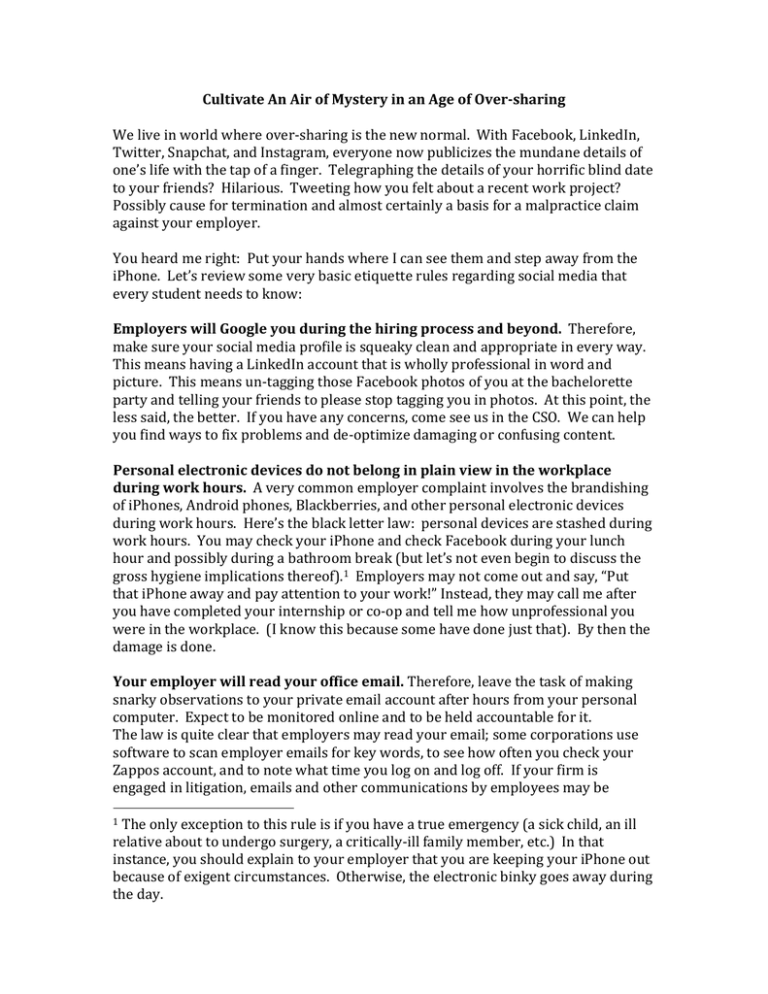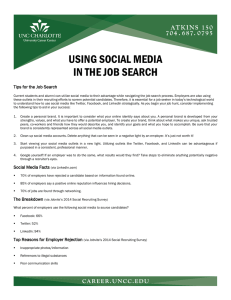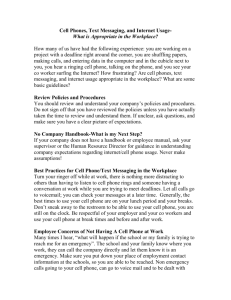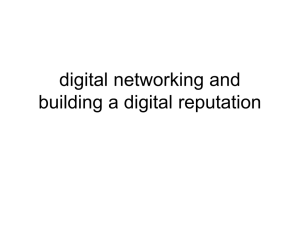Document 11676312
advertisement

Cultivate An Air of Mystery in an Age of Over-­‐sharing We live in world where over-­‐sharing is the new normal. With Facebook, LinkedIn, Twitter, Snapchat, and Instagram, everyone now publicizes the mundane details of one’s life with the tap of a finger. Telegraphing the details of your horrific blind date to your friends? Hilarious. Tweeting how you felt about a recent work project? Possibly cause for termination and almost certainly a basis for a malpractice claim against your employer. You heard me right: Put your hands where I can see them and step away from the iPhone. Let’s review some very basic etiquette rules regarding social media that every student needs to know: Employers will Google you during the hiring process and beyond. Therefore, make sure your social media profile is squeaky clean and appropriate in every way. This means having a LinkedIn account that is wholly professional in word and picture. This means un-­‐tagging those Facebook photos of you at the bachelorette party and telling your friends to please stop tagging you in photos. At this point, the less said, the better. If you have any concerns, come see us in the CSO. We can help you find ways to fix problems and de-­‐optimize damaging or confusing content. Personal electronic devices do not belong in plain view in the workplace during work hours. A very common employer complaint involves the brandishing of iPhones, Android phones, Blackberries, and other personal electronic devices during work hours. Here’s the black letter law: personal devices are stashed during work hours. You may check your iPhone and check Facebook during your lunch hour and possibly during a bathroom break (but let’s not even begin to discuss the gross hygiene implications thereof).1 Employers may not come out and say, “Put that iPhone away and pay attention to your work!” Instead, they may call me after you have completed your internship or co-­‐op and tell me how unprofessional you were in the workplace. (I know this because some have done just that). By then the damage is done. Your employer will read your office email. Therefore, leave the task of making snarky observations to your private email account after hours from your personal computer. Expect to be monitored online and to be held accountable for it. The law is quite clear that employers may read your email; some corporations use software to scan employer emails for key words, to see how often you check your Zappos account, and to note what time you log on and log off. If your firm is engaged in litigation, emails and other communications by employees may be 1 The only exception to this rule is if you have a true emergency (a sick child, an ill relative about to undergo surgery, a critically-­‐ill family member, etc.) In that instance, you should explain to your employer that you are keeping your iPhone out because of exigent circumstances. Otherwise, the electronic binky goes away during the day. discoverable. Think long and hard before you hit “send” with the message that you think your client is keeping two sets of books. That’s why the telephone is your new best friend in the workplace. Plausible deniability, hello! Keep your thoughts to yourself. An insurance carrier recently provided training at a law firm as part of that firm’s malpractice coverage. During the training, the insurer explained that they recently had to settle a professional malpractice claim against another law firm because one of the associates posted on Facebook: “I just finished writing a brief for XYZ corporation and didn’t have a clue about what I was doing!” Let’s just say this didn’t end well for the associate. Your days of over-­‐sharing are now officially over. It’s now time to start a new chapter in your professional life entitled, “Cultivating an Air of Mystery.” To wit: “How was your weekend?” “Great! How was yours?” “What are you working on this week?” “I’m not sure…. Well, bye!” Then smile sweetly and get to work. Clients value lawyers who are discreet. Discretion is not only a wise quality to cultivate, it’s also part of your professional responsibility as an officer of the court. Enough said. # # #





